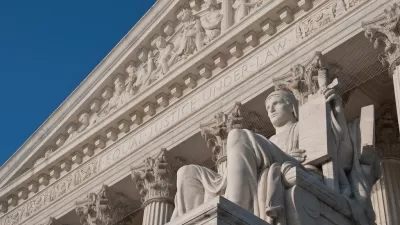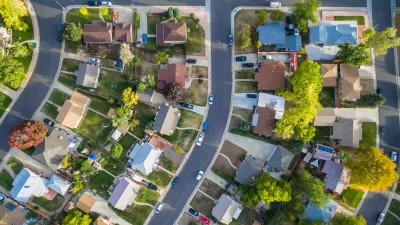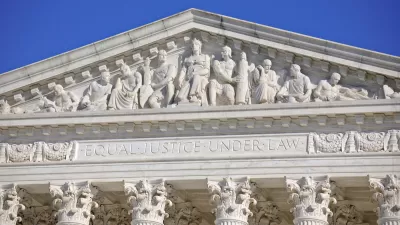The Fair Housing Act, considered under threat by the Trump Administration and the Republican majority in Congress, still has power, but cities have long road ahead to prove bans liable for harms caused by predatory and discriminatory lending.

"The U.S. Supreme Court ruled Monday that the city of Miami can sue the nation’s largest financial institutions over allegations that predatory lending practices in minority communities violated the Fair Housing Act and contributed to a real estate meltdown that nearly bankrupted the city," report Lance Dixon and David Smiley.
In effect, the ruling protects the right of the city to sure the banks, but Dixon and Smiley describe the court victory as partial: "the justices also vacated the portion of the 11th Circuit’s ruling that found the city had sufficiently argued that the banks’ activities can be directly blamed for the city’s financial problems on the basis that the fallout should have been foreseeable. They directed the court to reassess that issue, with the three dissenting justices remaining highly skeptical that the city can prove its case."
That being said, the ruling opens the door for cities all over the country to sue banks for discriminatory and predatory lending. Similar lawsuits are pending in Los Angeles, Cook County in Illinois, Oakland, and Miami Gardens.
There's another takeaway from the court ruling, as expressed in a follow-up article by Oscar Perry Abello: "The Fair Housing Act (FHA) lives, for now." Perry Abello quotes from a statement released by the American Civil Liberties Union following the Supreme Court decision, with this soundbite from Dennis Parker, director of the ACLU’s Racial Justice Program: "With this decision, the Supreme Court has acknowledged the crucial role of municipal governments in protecting residents’ rights. In housing and lending as in other areas, cities can and should serve as a bulwark against discrimination."
FULL STORY: Miami can sue big banks for predatory lending, Supreme Court rules

Alabama: Trump Terminates Settlements for Black Communities Harmed By Raw Sewage
Trump deemed the landmark civil rights agreement “illegal DEI and environmental justice policy.”

Planetizen Federal Action Tracker
A weekly monitor of how Trump’s orders and actions are impacting planners and planning in America.

The 120 Year Old Tiny Home Villages That Sheltered San Francisco’s Earthquake Refugees
More than a century ago, San Francisco mobilized to house thousands of residents displaced by the 1906 earthquake. Could their strategy offer a model for the present?

Ken Jennings Launches Transit Web Series
The Jeopardy champ wants you to ride public transit.

BLM To Rescind Public Lands Rule
The change will downgrade conservation, once again putting federal land at risk for mining and other extractive uses.

Indy Neighborhood Group Builds Temporary Multi-Use Path
Community members, aided in part by funding from the city, repurposed a vehicle lane to create a protected bike and pedestrian path for the summer season.
Urban Design for Planners 1: Software Tools
This six-course series explores essential urban design concepts using open source software and equips planners with the tools they need to participate fully in the urban design process.
Planning for Universal Design
Learn the tools for implementing Universal Design in planning regulations.
Clanton & Associates, Inc.
Jessamine County Fiscal Court
Institute for Housing and Urban Development Studies (IHS)
City of Grandview
Harvard GSD Executive Education
Toledo-Lucas County Plan Commissions
Salt Lake City
NYU Wagner Graduate School of Public Service




























